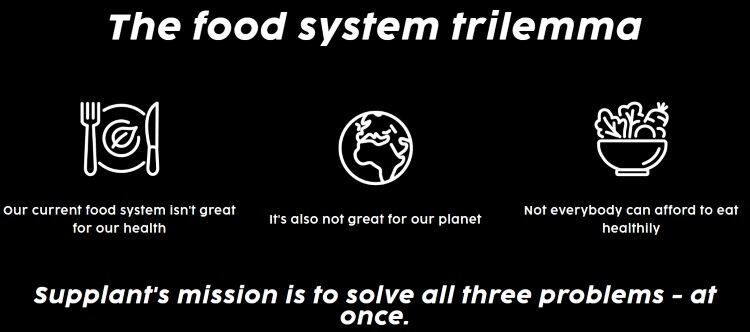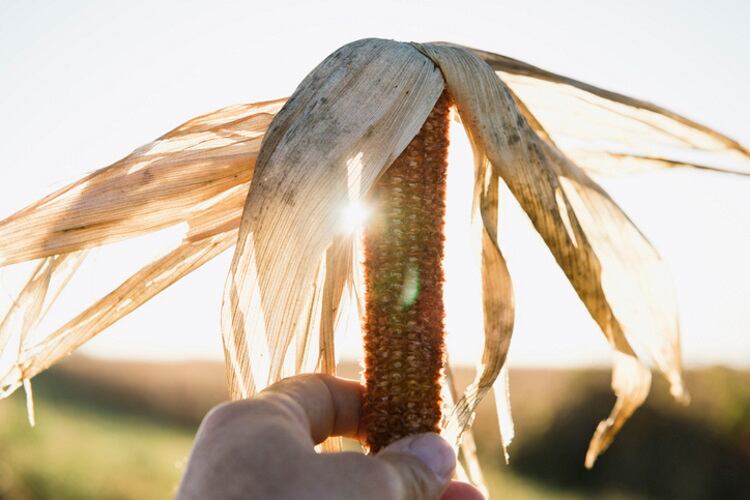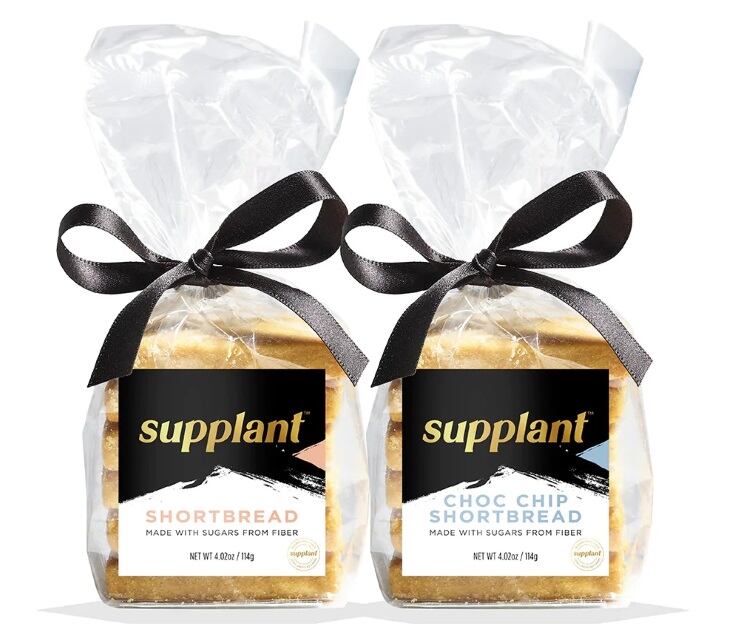The Supplant Company is rethinking sugar.
The oft-viewed culprit of many of the world population’s nutritional issues has been given a makeover, by upcycling fibre-rich, ‘prebiotic’ portion of crops typically discarded to sweeten cookies and chocolate created in collaboration with Chef Thomas Keller, the first and only American-born chef to simultaneously hold two three three star Michelin ratings for his California restaurant The French Laundry.
Not only is Supplant sugar designed to break consumers’ reliance on cane sugar – the average American consumes around 17 teaspoons of added sugar a day – it is also addressing an issue that is easily overcome.
As much as 40% of all food in America ends up wasted, worth more than $400bn each year. While much of that happens in the kitchen, “a big chunk happens before that,” said Dr Simmons.
The food system trilemma

“What we call the food system trilemma is the way we think about the broad problems in the food system right now … [1] in terms of nutrition, which, of course, sugar is major issue and has been an issue for a while … [2] sustainability, increasingly people are recognising the impact of the agricultural system … and [3] food security or food equity: on a macro scale, we need 50% more food to feed the population of 2050 but we don't have 50% more land, while on a micro scale, it's the existence of ‘nutrient deserts’ – places where it's quite hard to get good quality food,” said Dr Simmons.
“These things are all interconnected and you really can't set address one in a way that's abstracted from the others; for example, if you have an innovation to make more nutritious food, but you do so at the expense of the total output of the agricultural industry.
“So, if you want to address these things, you really need to be thinking holistically systemwide across all of those issues.”
He added, “I think what we’re doing is really one of the very few ways in which we can attempt to have an innovation that is unambiguously good, insofar as it addresses nutrition and sustainability and food security in one coherent whole.”
The mission is to make ingredients that can make food products more sustainable, more healthy and more abundant: all in one fell swoop: Dr Tom Simmons
New category of food ingredient

The Cambridge, UK-based team of scientists is defining a new category of food ingredient by tapping the fibrous portion of crops – the stems, stalks, husks and cobs typically turned into animal feed, left to decompose in the field, burned or binned – to create a better-for-you sugar.
The process to draw out the natural sugars in the fibrous plants uses fungal enzymes and is proprietary to Supplant, but the result is a sugar that behaves like traditional sugar, while retaining the nutritional properties of fibre, being lower in calories, lower glycaemic response, good for gut health and packed with prebiotics.
“The mission is to make ingredients that can make food products more sustainable, more healthy and more abundant: all in one fell swoop,” said Dr Simmons.
“The distinctive thing that we do is we make ingredients from agricultural side streams … the stuff that is produced on farms but is currently not widely utilised – the structural parts of the plants that house the popular parts (starch, sugar, grain, bean, oil, etc) that are actually the most abundant part of part of the plant.
“By bringing our fibre-derived ingredients into our food system, we're adding fibre benefits and reducing the negative impacts of refined sugar, carbohydrates and excess calories. Most importantly, we only do it while making delicious foods,” said Dr Simmons.
“Sugars from Fibre looks, tastes and feels like sugar; but it’s nutritious, too. It has half the calories and doesn’t cause an insulin spike like refined sugar. And because we make it from otherwise unused agricultural plant fibre, it’s good for the planet, too – especially biodiversity.”
Growing its footprint and impact

Vindication, undoubtedly, comes in the form of endorsement from American culinary superstar, Chef Thomas Keller, who has established a collection of restaurants that set a new paradigm within the profession, including The French Laundry in Napa Valley, and Per Se in New York, among others.
Dr Simmons tells us how a handwritten letter caught the attention of the renowned chef, and a partnership was forged in the spring of 2021 to officially launch Supplant Sugars from Fibre in ice cream, cookies and chocolate. Since then, the partnership has launched several new products – including a chocolate bar and shortbread – available both online and in limited retail, but the plan is to go much bigger.
“As we evolve our offering to better serve our commercial partners, we found that producing and distributing premium confectionery inclusions such as chocolate chips created with Supplant sugars from fibre grows our footprint and impact,” said Dr Simmons.
“Expanding our offering beyond a raw ingredient to inclusions and CPG products furthers our mission to create a whole new category of ‘sugars from fibre’ and ultimately reduce the demand for cane sugar while providing a solution to agricultural food waste.”
Listen to the podcast to find out how The Supplant Company continues to gear towards commercial partners for direct wholesale purchase, including food service and CPG brands, with various applications from bakery to cereals and snacks.


